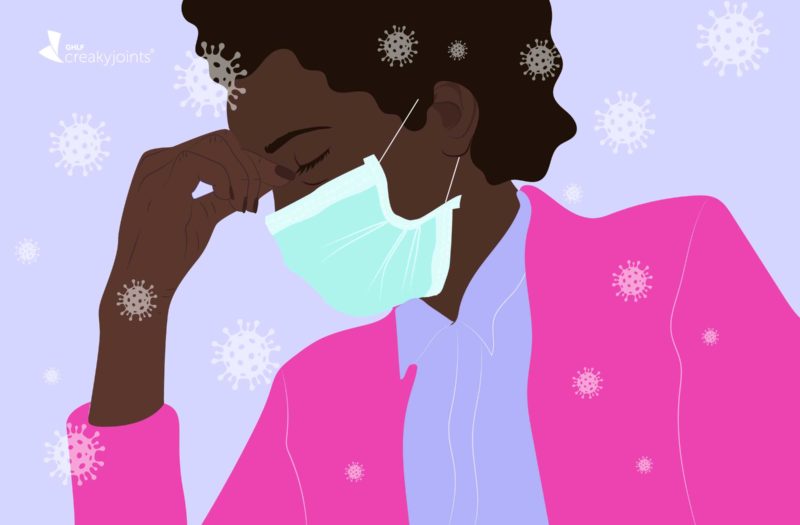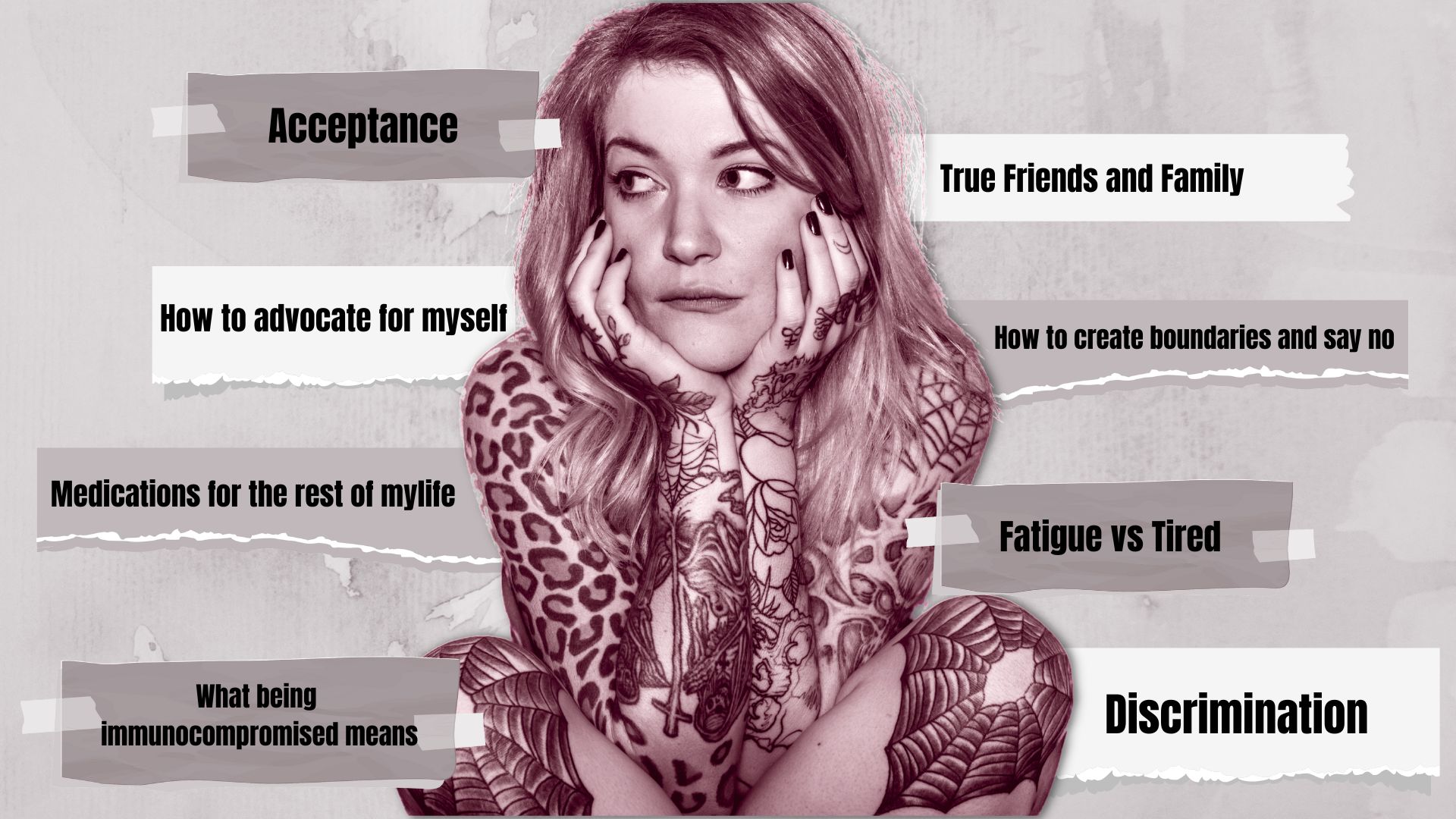Throughout the pandemic, you’ve likely taken every possible measure to avoid getting COVID-19. However, if you did contract the virus and you’re immunocompromised, you may wonder what it means for your future (and what to do now).
COVID-19 has become notorious for causing long-term symptoms in many people. These symptoms can be easy to confuse with those of your underlying condition — think fatigue, sleep problems, and more.
That said, there are several actionable steps you can take to make sure you set yourself up for the best health possible, even if you’ve already had COVID-19.
Consider Your Risk for Long COVID
Certain factors may put you at greater risk of developing long COVID or long-haul COVID, which is defined as a wide range of new, returning, or ongoing health problems people can experience four or more weeks after contracting COVID-19, per the U.S. Centers for Disease Control and Prevention (CDC). You can have post-COVID symptoms even if you didn’t have symptoms in the days or weeks after you were first infected.
There is still much to be learned about long COVID and researchers are uncertain if immunocompromised patients are at higher risk for it. A February 2022 study in Rheumatology Advances in Practice found that while many patients with autoimmune rheumatic and musculoskeletal diseases (ARDs) experienced fatigue after COVID-19, it wasn’t at a higher rate than those with non-autoimmune rheumatic and musculoskeletal diseases (NARDs).
Meanwhile, in a preliminary study presented at ACR Convergence 2021 — the annual meeting of the American College of Rheumatology — researchers from Hospital for Special Surgery (HSS) surveyed adult patients who were evaluated at least once by a rheumatologist at a large rheumatology center in New York City. They found that there was no significant difference in the percent of long haulers with a systemic rheumatic disease like inflammatory arthritis, spondyloarthritis, vasculitis, and lupus than those without.
That said, long haulers were more likely to have one or more medical comorbidities and be a current or former smoker. They were also more likely to have used corticosteroids for three or more months at the time of COVID-19 diagnosis. Researchers aren’t sure yet if this is due to chronic immunosuppression from corticosteroids predisposing patients to post-viral symptoms.
“Our prior work, as well as others, have shown that long COVID is potentially a problem in rheumatology patients,” says Medha Barbhaiya, MD, MPH, rheumatologist at Hospital for Special Surgery (HSS) and lead author of the study. “However, the underlying causes and risks of long COVID in patients with rheumatic diseases who are immunocompromised, compared to the general population, still remain to be determined.”
Factors such as older age, being female, and hospitalization at symptom onset have been found to be significantly associated with an increased risk of developing persistent symptoms, per a July 2021 review in the Journal of the Royal Society of Medicine. Needing oxygen therapy, pre-existing hypertension, and chronic lung conditions were also highlighted in the study as being main determinants of long-term symptoms.
“We’re seeing that people on high-risk medications are more likely to contract severe disease and go into the hospital,” says rheumatologist Jiha Lee, MD, a Clinical Assistant Professor at Michigan Medicine. “On top of that, they often have interruptions to their medication use — which adds to the complexity of disease flares and all fatigue syndromes.”
Be Aware of Long-Haul COVID Symptoms
According to the CDC, individuals with long COVID commonly report experiencing various combinations of the following symptoms:
- Difficulty breathing or shortness of breath
- Tiredness or fatigue
- Symptoms that get worse after physical or mental activities (also known as post-exertional malaise)
- Difficulty thinking or concentrating (sometimes referred to as “brain fog”)
- Cough
- Chest or stomach pain
- Headache
- Fast-beating or pounding heart (also known as heart palpitations)
- Joint or muscle pain
- Pins-and-needles feeling
- Diarrhea
- Sleep problems
- Fever
- Dizziness on standing (lightheadedness)
- Rash
- Mood changes
- Change in smell or taste
- Changes in menstrual period cycles
Of course, many of those symptoms are similar to what you might already experience as part of your underlying condition. Systemic autoimmune rheumatic diseases, including rheumatoid arthritis, connective tissue disease, idiopathic inflammatory myositis, and fibromyalgia and chronic fatigue syndrome share similar symptoms with long COVID, per a 2022 review in Clinical Rheumatology.
COVID-19 has also been reported to cause reactive arthritis and new-onset inflammatory arthritis, which typically occurs within a month after its diagnosis, per the review.
Meanwhile, sleep disturbances are estimated to affect up to 50 to 75 percent of COVID-19 patients, per a 2021 review in the Journal of Personalized Medicine. Researchers are working to better understand the relationship between long COVID and sleep, and the role supplements like melatonin may play in treating sleep disturbances, per the American Psychological Association.
“There is limited data available on long COVID in patients with rheumatic diseases, which can be a diagnostic challenge in this patient population due to the overlapping features with rheumatic diseases,” says Dr. Barbhaiya. “More longitudinal studies are needed to better understand long COVID in rheumatic disease patients and how symptoms and outcomes differ compared to the general population.”
It can be helpful to keep a symptom diary and share it with your doctor:
- Write down the types and severity of symptoms you have on a daily basis
- Make note if anything in particular seems to trigger the symptoms
- Record the date, time, activity (say, sleeping, walking, etc.), severity, and duration of your symptoms
“Patients know their body the best, so bringing that to your doctor helps to have a very well-informed discussion,” says Dr. Lee.
Get Back on Track With Medications
Your doctor may have temporarily stopped your medications during your infection period. However, you’ll likely be able to return to your normal medication routine after you recover.
“If any rheumatology medications were paused or reduced during COVID-19 infection, patients should speak with their rheumatologist about when to restart these medications,” says Dr. Barbhaiya.
Talk to your doctor about how long it might take for your medication to start working again. It will depend on the medication — with biologic infusions, for instance, some patients may notice an improvement within weeks of the first infusion, but it could take a few months for others.
Medication disruption has been a key topic of discussion in general during the COVID-19 pandemic. In a February 2022 preprint study, researchers analyzed surveys from COVID-19 survivors and found that 51 percent of 127 respondents on any disease-modifying antirheumatic drug (DMARD) reported a disruption to their regimen after COVID-19 onset.
“About half of people who survived COVID had disruptions to their medication, and as a consequence, about 40 percent experienced a flare,” says Dr. Lee, who was not involved in the study. “Medication is going to become an important conversational piece. I have a lot of patients quite anxious about how they should reintegrate.”
When it comes to treating your post-COVID symptoms, your doctor may recommend familiar therapies or lifestyle changes.
“For now, we don’t have targeted medications for long COVID — we’re borrowing a lot from how we were treating these syndromes with over-the-counter analgesics [pain relievers], stretches, muscle relaxants as needed, and physical therapy,” says Dr. Lee. “Encouraging people to be more active is also helpful.”
In fact, there’s evidence that tailored and supervised exercise training may be an effective therapy for post-COVID-19 syndrome, per a May 2021 review in the International Journal of Environmental Research and Public Health — but more research is needed to determine what types of exercises should be preferably prescribed.
Get Fully Immunized
Even if you’ve had COVID-19, you should still get all of the additional doses and booster doses of the vaccine that you’re eligible for.
People who already had COVID-19 and don’t get vaccinated afterward are more likely to get infected again than those who get vaccinated after their recovery, per the CDC. There aren’t any currently available tests that can reliably show if you’re protected from infection. Plus, if you’re immunocompromised, you’re at a greater risk of breakthrough infections.
“I’m still actively trying to get people boosted and vaccinated,” says Lynn Ludmer, MD, Medical Director of Rheumatology at Mercy Medical Center in Baltimore. “I’m also trying to educate people that they should contact me if diagnosed with COVID.”
Learning about what treatment options are available for the immunocompromised, including monoclonal antibody treatments and antiviral pills, is a worthwhile plan — even if you’ve already had COVID-19. Come up with an action plan now so you don’t have to if you’re feeling under the weather. Read about what it’s like to have COVID when you’re immunocompromised.
Stay in Touch With Your Doctor
The best way to plan for the future if you’ve had COVID-19 and are immunocompromised is to speak with your specialist. Keep in touch with your rheumatologist about your symptoms (and bring your symptom diary to each appointment) so you can determine when you’re experiencing symptoms outside of your underlying condition.
You may also decide to take extra mitigation efforts to avoid contracting COVID-19 again if you’re immunocompromised. For instance, you and your doctor may decide it’s safest for you to continue wearing a mask in public. (Hopefully it won’t happen, but here’s what to do if you get pushback for wearing a mask in public.)
Get Free Coronavirus Support for Chronic Illness Patients
Join the Global Healthy Living Foundation’s free COVID-19 Support Program for chronic illness patients and their families. We will be providing updated information, community support, and other resources tailored specifically to your health and safety.
Aiyegbusi OL, et al. Symptoms, complications and management of long COVID: a review. Journal of the Royal Society of Medicine. July 15, 2021. doi: https://doi.org/10.1177/01410768211032850.
Barbhaiya M, et al. Risk Factors for “Long Haul” COVID-19 in Rheumatology Outpatients in New York City [abstract]. Arthritis & Rheumatology. November 2021. https://acrabstracts.org/abstract/risk-factors-for-long-haul-covid-19-in-rheumatology-outpatients-in-new-york-city/.
Di Iorio MD, et al. DMARD disruption, disease flare, and prolonged symptom duration after acute COVID-19 among participants with rheumatic disease: A prospective study. medRxiv. February 9, 2022. doi: https://doi.org/10.1101/2022.02.08.22270696.
Frequently Asked Questions about COVID-19 Vaccination. COVID-19. U.S. Centers for Disease Control and Prevention. March 23, 2022. https://www.cdc.gov/coronavirus/2019-ncov/vaccines/faq.html.
Growing concerns about sleep. American Psychological Association. June 1, 2021. https://www.apa.org/monitor/2021/06/news-concerns-sleep.
Interview with Medha Barbhaiya, MD, MPH, rheumatologist at Hospital for Special Surgery (HSS) and lead author of the study
Interview with rheumatologist Jiha Lee, MD, a Clinical Assistant Professor at Michigan Medicine
Interview with Lynn Ludmer, MD, Medical Director of Rheumatology at Mercy Medical Center in Baltimore
Jimeno-Almazán A, et al. Post-COVID-19 Syndrome and the Potential Benefits of Exercise. International Journal of Environmental Research and Public Health. May 17, 2021. doi: https://doi.org/10.3390/ijerph18105329.
Leon L, et al. Persistent post-discharge symptoms after COVID-19 in rheumatic and musculoskeletal diseases. Rheumatology Advances in Practice. February 17, 2022. doi: https://doi.org/10.1093/rap/rkac008.
Pataka A, et al. Sleep Dysfunction in COVID-19 Patients: Prevalence, Risk Factors, Mechanisms, and Management. Journal of Personalized Medicine. November 14, 2021. doi: https://doi.org/10.3390/jpm11111203.
Post-COVID Conditions. COVID-19. U.S. Centers for Disease Control and Prevention. September 16, 2021. https://www.cdc.gov/coronavirus/2019-ncov/long-term-effects/index.html.
Sapkota HR, et al. Long COVID from rheumatology perspective — a narrative review. Clinical Rheumatology. November 30, 2021. doi: https://doi.org/10.1007/s10067-021-06001-1.






